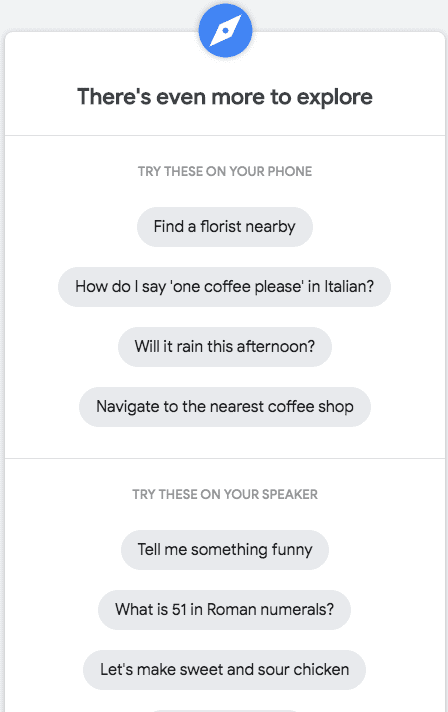At Super Bowl time in the US, TV advertisers pull out all the stops and pay millions for a 30 second or maybe one-minute spot. This past Super Bowl Amazon went even further and paid for a minute and a half to advertise on behalf of their AI voice assistant, Alexa. If you missed the spot, take a look. It’s funny as heck and stars a dog who outshines Harrison Ford, which is hard to do.
Not to be topped, Google went one further. They paid Macaulay Culkin to recreate some of his most iconic scenes from Home Alone. But as Home Alone would have played out had Kevin had access to a Google Home Speaker.
The battle for voice assistant domination is real. And not only is the rise of these voice assistants moving fast – a recent report says that smart speakers are in 1/4 of American homes now and the UK is catching up – but the SEO world is preparing to make the big shift to accommodate a whole new frontier; voice search optimization.
What is Voice Search?
Basically, voice search is the ability to talk to a device and get answers back. Ask Alexa what the weather is, and she’ll tell you the current temperature and forecast for your location. Ask Google for the news, and it will read off the latest headlines to you. Ask Siri to give you a recipe for spag bol, she will. This is powerful stuff.
In fact, Andrew Ng, formerly of Baidu, estimates that 50% of all searches will be completed via either speech or image search by 2020.
Generally, we humans can speak four times faster than we can type (for me it’s about eight). So on one level, voice search feeds our need to move fast. On another level, it’s about ease. Voice search is very natural. It’s just so much easier to ask for something out loud than it is to type. People are lazy – yes we are – and voice search feeds into this behavior perfectly.
Voice search is in the palm of your hand. It’s in your car, either through an embedded system or through systems like Apple Carplay and Android Auto. And an Amazon Echo for the car is on its way, for those with lower-end rides that don’t come with voice search equipped.
Voice search is sitting on peoples’ shelves, in the form of an Amazon Echo, a Google Home or an Apple HomePod. In China, it’s the Ling Long Ding Dong (yes it’s really called that), and literally dozens more voice-activated competitors are pouring into the Chinese market and into the US and UK via marketplaces like AliExpress.
Voice search changes the way results are provided to consumers. They ask a question and get an answer, just one spoken result. Unlike traditional web-based search, where lots of results are displayed as a list — encouraging exploration, engagement, and choice – voice search is all about the one best answer.
This means the pressure has never been greater to get your house in order, to optimize correctly and to employ every option you can to secure an engine’s trust. Ideally, if you’ve done everything you can and gained the trust, you’ll be the one answer trusted enough to be spoken out loud.
But don’t think that once you reach this goal, it’s your prize forever. Just like in regular SEO, the search engines are always testing and trying to find even better “best” answers for their searchers.
While this high level is important and should be monitored, there is another layer here. For each system providing voice results, an app backs them up. In that app, it shows more results. These apps become a kind of filing cabinet for your journeys. It collects everything you ask, seek, explore or question with answers immediately on hand.
Learning the new language of SEO
Consumers are being taught how to ask devices for answers, which is a very natural extension of their current behaviors — this lowers the barrier to adoption and helps account for the large growth in voice-based queries today. Both Google and Amazon frequently send out emails to their users filled with ideas of what to try out next:

People type questions in a different way than they speak them out loud. This is because we can speak more words per minute than we can type, and also because we are less deliberate with our words when we speak than we are when we type out a traditional query. So voice search is far more conversational.
For an SEO that means learning what questions people might be asking most frequently and then providing the answers for them. It’s all about not keywords anymore. If you say SEO London to Google Home, she’ll tell you ‘sorry I can’t help’. Same for Alexa, Siri, and Cortana (I tested) So what might drive traditional SERPs positioning for a site – in my case SEO London for my company Pearl Lemon – will be useless on voice search. For now.
However, when I asked her ‘who is the best SEO agency in London’? and she reeled me off the contents of the Google Local 3 pack immediately. It’s all in the way you ask. And what she knows. When I simply barked ‘Pizza, Fulham’ she did return results from the three-pack again. She failed again on ‘Indian Food, Fulham’ but knew what I was talking about when I asked her ‘where can I get the best Indian food in Fulham?’.
Mastering voice search is going to entail a lot of trial and error and a lot of experimenting. Maintaining just the right balance between traditional search and voice search will be a challenge too. And just when we think we’ve got it right the speakers will get smarter – Google Home keeps telling me she’s learning – stuff will change. But that’s SEO for you. The good news for my clients is that my team and I love this stuff. So you can be sure we’ll be right on top of it.








